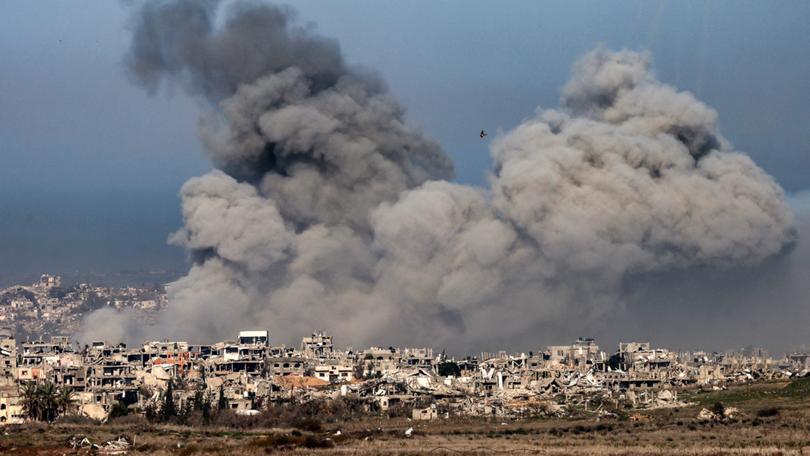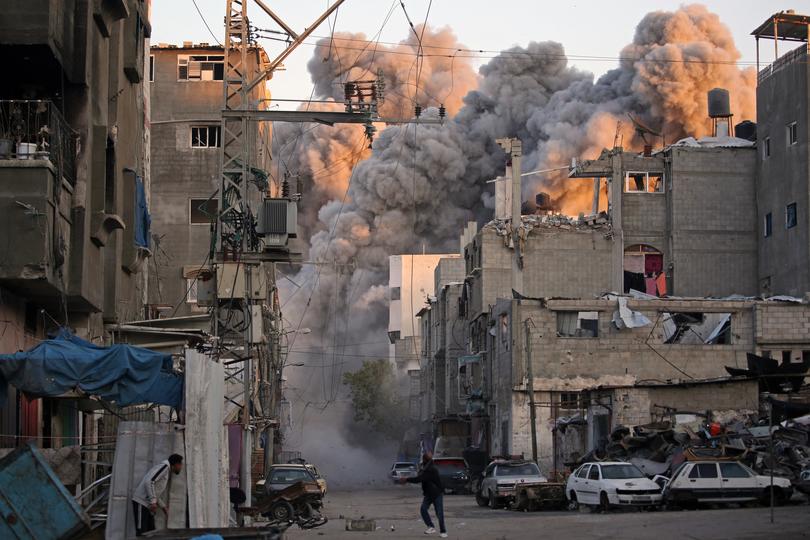BREN CARLILL: Gaza’s next chapter depends on whether the international community is willing to act decisively
BREN CARLILL: Gaza’s next chapter depends on whether the international community is willing to act decisively. If not, this ceasefire could be remembered as a brief pause before the next war.

The ceasefire between Hamas and Israel marks a critical juncture for Gaza. Australian Foreign Minister Penny Wong — among many others — has expressed hope that a peaceful Gaza might emerge from the rubble. While few would disagree, history provides a precedent worth examining: post-war Germany.
The parallels between Gaza today and Germany in 1945 are striking. Both experienced the defeat of violently ideological regimes that prioritised conflict over the welfare of their populations. And, in both, the war brought about immense physical destruction.
But Germany’s transformation from murderous regime to peaceful democracy was not the product of chance. After the Allies won the war, the Marshall Plan poured billions of dollars into reconstruction. Those funds came with stringent de-nazification conditions. A new German constitution, drafted under Allied oversight, embedded democratic values and outlawed Nazi ideology. An entire population brainwashed with Nazi propaganda had to be re-educated. Allied troops remained on German soil to enforce the terms of reconstruction.
Sign up to The Nightly's newsletters.
Get the first look at the digital newspaper, curated daily stories and breaking headlines delivered to your inbox.
By continuing you agree to our Terms and Privacy Policy.It was far from easy. But the conditions imposed by the Allies, coupled with their willingness to enforce them, completed the process that the war began, turning Nazi Germany into democratic Germany.
Could Gaza follow a similar path? Senator Wong has been unequivocal in stating that there’s no place for Hamas in a future Gaza. Her words reflect a vital first step: acknowledging that rebuilding Gaza requires more than just money. Without conditions, reconstruction risks entrenching the same destructive dynamics that led to the current devastation. After all, Gaza has been the recipient of billions of foreign aid dollars for decades. But this aid, which came without enforced conditions, allowed Hamas to arm itself, build the world’s largest military tunnel complex under Gaza’s neighbourhoods, and then invade Israel, leading to the recent war.
It goes without saying that imposing conditions in Gaza is complicated. Hamas’s ideology is deeply entrenched; Hamas was in charge of school curriculum for 16 years, in a territory where the median age is 18. Erasing this influence will demand a sustained effort to reshape Gaza’s political, social and economic systems – something for which the international community has, historically, shown zero appetite.
Enforcement is the most glaring challenge. In Germany, Allied forces remained for decades to oversee reconstruction and suppress any resurgence of extremism. There is little chance that foreign troops will be posted to Gaza. And, even if they are, the examples provided by UNIFIL in Lebanon and UNRWA in Gaza and elsewhere prove that international peacekeepers and aid workers on Israel’s borders look the other way rather than confront terrorists. Indeed, there are copious examples of UNIFIL and UNRWA actually co-operating with terrorists.
Without enforcement of conditions, there is a high risk that funds intended for rebuilding civilian infrastructure will again be diverted to rearmament. Hamas and other terrorist groups have a long record of using aid supplies to fortify their military capabilities, whether by building tunnels or stockpiling weapons in civilian areas.
Even without direct enforcement, the international community could wield other tools, such as withholding aid if Gaza’s new government glorifies violence or undermines peace. But history suggests these measures are rarely used with the necessary consistency. More often, foreign governments issue wet lettuce statements whilst continuing to pour in aid money that is ultimately exploited by terrorist groups. Certainly, Australia is guilty of this. The result is a cycle of violence: reconstruction fuels rearmament, which sets the stage for the next conflict.

If the international community won’t enforce the conditions necessary for Gaza’s transformation, it is effectively guaranteeing more wars between Israel and Hamas. Without a determined effort to sever the link between aid and militarisation, the same forces that led to Gaza’s devastation will remain intact, perpetuating the conflict.
To put it succinctly: as long as Gaza is ruled by groups that seek Israel’s violent destruction, war with Israel is inevitable.
None of this is to say that reconstruction should be abandoned — the people of Gaza deserve a chance to rebuild their lives and escape the grip of extremism. But reconstruction alone will not bring peace. If peace (as opposed to a few years of quiet) is the objective, then aid must be tied to a broader strategy, one that insists upon governance reform, accountability and dismantling terrorist infrastructure.
This ceasefire is a test of the international community’s resolve. The hope expressed by Senator Wong is not enough. The Foreign Minister says there’s no future for Hamas in Gaza; what concrete steps will she take to further this goal? The Australian Government should not provide any funds if the minimum conditions for eventual peace are not met.
Gaza’s next chapter depends on whether the international community is willing to act decisively. If not, this ceasefire will be remembered not as the start of something better, but as a brief pause before the next war.
Dr Bren Carlill is the director of special projects at the Australia/Israel & Jewish Affairs Council, and the author of The Challenges of Resolving the Israeli-Palestinian Dispute.
